It is viewed as the premier event on Australia’s visual arts calendar, with the invitation to exhibit a once-in-a-lifetime opportunity for many artists. But this year, a shadow was cast over the Biennale of Sydney, with several artists boycotting the festival’s long-time sponsorship by Transfield Holdings (Transfield is a shareholder in Transfield Services, the company recently contracted by the Abbott Government to run the detention centres on Manus and Nauru islands.)
Then, with two weeks before the curtain was due to go up on the 19th Biennale, Transfield announced the withdrawal of its sponsorship and Transfield executive director Luca Belgiorno-Nettis resigned as Biennale chairman.
Despite the complexity and negativity surrounding the event in recent weeks, one of ARMEDIA’s own is relieved the shadow has somewhat lifted. “It’s a start, for sure, in terms of collective repudiation of the detention regime,” says creative director and artist Deborah Kelly.
Although it may seem a world away now, given recent events, Deborah still remembers getting the call from Biennale artistic director Juliana Engberg, inviting her to create a suite of new collages for the three-month festival. “You can’t quantify it,” she says of the invitation. “It’s magic and luck, and happenstance.”
Deborah’s work, called ‘No Human Being Is Illegal (In all our glory)’, is expanded from Engberg’s original brief, involving participation from a wide group of collaborators. “I’m experimenting with collage as a collective enterprise,” she says. “I want participants to feel like they’ve had some practise in collectivity, in making co-operative decisions on the ethical, aesthetic, and practical dilemmas we face together, making this work.
“I’ve invited people to come and make works with me,” she explains. “They’re going to be a series of 19 life-sized nude photographic portraits of all different kinds of people from around Australia—a magnificent variety—and in a workshop situation they will be collaged upon while the collagists are listening to readings devised by the subjects of the portraits.”
The readings include manifestos, fairy tales, science texts about global warming, poetry, music … and a performance or two thrown into the mix.
“It takes so long to explain, but it’s a nine-month long project so I just don’t seem able to reduce it to a sound bite—it’s a complicated work and there are about 70 people involved in it so far,” she says. “People seem pretty into it!” 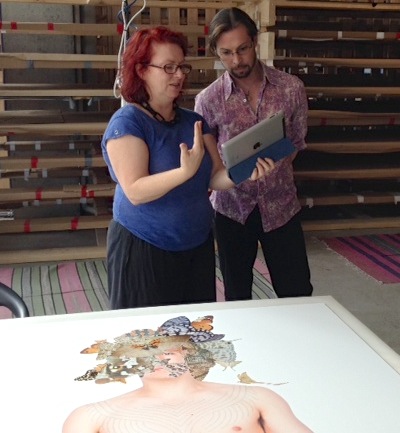
A call to arms, and legs…
When Deborah first put out the call for models to strip off and be photographed, she was overwhelmed by the response from more than 230 people from of all walks of life, in all shapes and sizes and with their own unique stories, who wanted to take part—including her 87-year-old father. “My dad didn’t really offer, he insisted!” Deborah says.
The workshops, which started late last year and will continue through to the end of the Biennale (9 June), are open to everyone over the age of 18 (“because there is nudity and sharp knives!”).
And after attending one of the workshops (most of which were run in the magnificent, purpose-built studio in Sydney’s living mall, Central at Central Park) it’s clear the group assembled truly loves the role they are playing in the creation of each piece. “Everyone has put in such serious labours to bring the works to life,” Deborah says.
“The works represent collaboration, the animated collective, representation of people—their lives and bodies—who we do not see in art galleries, bringing production to the institution and complicating its regime of consumption, attending to the material culture of books and the knowledge in them, and the framing of that knowledge as they are superseded or displaced or rendered obsolete by the digital and pass from this world.
“They also represent in a broader sense a temporary utopia; a teaching and learning space of pleasure and exchange that is in no hurry: a time out of time, an analogue island in a digital slipstream.”
It’s not the first time Deborah’s socially engaged art has been of a collaborative nature. Other projects include boat-people.org and the prize-winning public artwork series Hey, hetero!, created with Tina Fiveash (hopefully you got to see these in the flesh in bus stops, billboards and magazines). And her ‘Tank Man Tango’ memorial, devised for the 20th anniversary of the Tiananmen Square massacre, was performed in 20+ cities on 4 June 2009.
When asked about the true audience of this work—whether that is the collective collagists, the subjects of the portraits, or those viewing the pieces to be displayed in progress at the Art Gallery of NSW—Deborah says the question remains open. Be sure to check out these beautiful, moving pieces and figure out the answer for yourself.
Deborah has been making political art since the early 1980s. Check out her talk at Community Child Care Co-operative’s Smart Party. Here’s but a taste of some of her earlier work…
- One of Deborah’s early cartoons, 1980s.
- Hey hetero!, with Lisa Fiveash, 2001.
- Hey hetero! featured in bus stops, billboards and magazines around the country.
- boat-people.org projection onto the Sydney Opera House sails, 2001.
- Boat-people.org’s response to repeated discourse demonising asylum seekers.
- Rile Nile Home Kraft Kit. Sydney, 2002-2003.
- This work was created in response to calls to ban girls wearing the hijab to school.
- This banner was created for the Venice Biennale, 2003.
- Beware of the God projection onto clouds, Sydney 2005.
- The projection was repeated for the Singapore Biennale, 2008
- Denial Beer – Best We Forget, 2006.
- Beastliness collage work discusses how women are represented, 2012.
- Beastliness collage, 2012
- The Miracles explores the miracle of IVF and other forms of ‘immaculate’ conception
- The Miracles were modelled on renaissance holy family portraits.

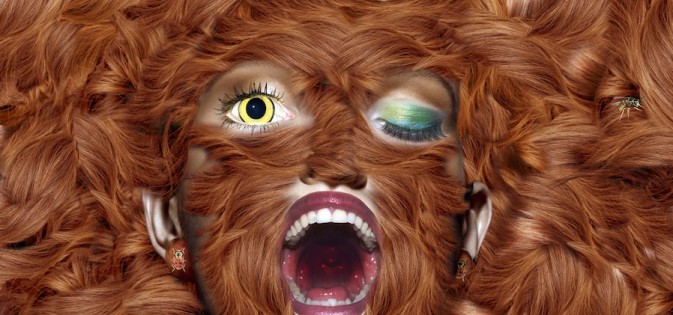
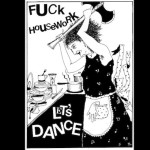
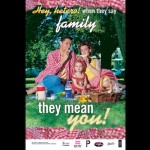
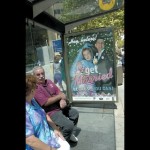
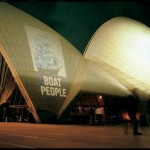
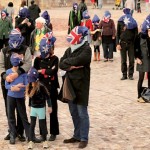

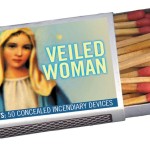
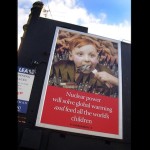
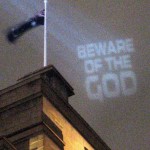
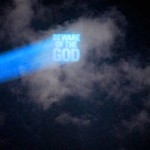


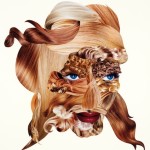
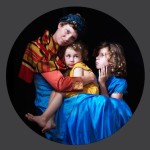


No Comments Yet